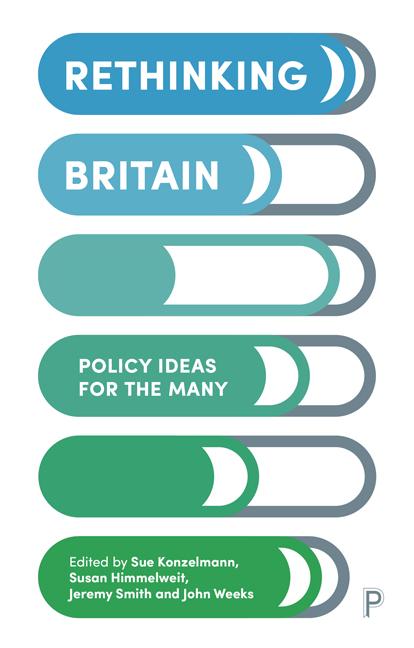Book contents
- Frontmatter
- Contents
- List of Tables and Figures
- The Contributors
- Foreword
- Introduction
- Interlude: ‘Mirror, Mirror, On the Wall – Who has the Highest Debt of All?’
- Part One Building a Full-Employment Economy: Introduction
- Part Two Public Investment – Prioritising Society Rather than Profit: Introduction
- Part Three Making Finance Work for Society: Introduction
- Part Four Genuine Social Security: Introduction
- Part Five How to provide for Social Needs: Introduction
- Conclusion
- Jargon Busters
- References and Further Reading
- Index
Part Two - Public Investment – Prioritising Society Rather than Profit: Introduction
Published online by Cambridge University Press: 11 March 2021
- Frontmatter
- Contents
- List of Tables and Figures
- The Contributors
- Foreword
- Introduction
- Interlude: ‘Mirror, Mirror, On the Wall – Who has the Highest Debt of All?’
- Part One Building a Full-Employment Economy: Introduction
- Part Two Public Investment – Prioritising Society Rather than Profit: Introduction
- Part Three Making Finance Work for Society: Introduction
- Part Four Genuine Social Security: Introduction
- Part Five How to provide for Social Needs: Introduction
- Conclusion
- Jargon Busters
- References and Further Reading
- Index
Summary
Following the financial crisis in 2008, and fearing that their financial systems would collapse if they didn’t, many governments invested huge amounts of public money to resurrect banks deemed ‘too big to fail’. But not all. Iceland's banks had grown too big to rescue, with loans amounting to ten times the size of the entire national economy. So, unlike in the UK, the Icelandic banks were allowed to fail, while Iceland prioritised its people over finance. As a result, Iceland today is in far better economic shape than most of the rest of Europe. The message is therefore clear: the state can choose what to invest in, what its objectives should be and what form the returns from that investment should take.
Listening to many in the media, as well as free market economists, it is easy to get the impression that the only choice on offer is between the ‘free market’ policies that produced the present situation and those described as ‘hard left’, ‘Trotskyite’ or even ‘totalitarian’, which apparently failed during the 1970s. But this is a smokescreen that obscures the real question: what policies do we need now, to address the problems we currently face? Turning the clock back to the 1940s, the 1970s – or, indeed, the 1980s – won't answer that question. A better bet is to look at new ideas and not to rely on dogma.
New ideas in themselves, however, may not always be enough. They will not have been tried before, so implementing them would, to some degree, be an experiment. For others, there may be something to be learned from economic history. In other words, what happened when similar ideas were tried in the past? What can we learn from this – and what might we do differently this time? Economic history reveals, for example, that much of the programme of nationalisation in Britain, following the Second World War was undermined by failing to look forward and invest in the future. Economic history should also have told former Chancellor George Osborne that austerity during a recession not only makes things worse, economically; it also makes people wonder how things could be done differently.
- Type
- Chapter
- Information
- Rethinking BritainPolicy Ideas for the Many, pp. 57 - 59Publisher: Bristol University PressPrint publication year: 2019



